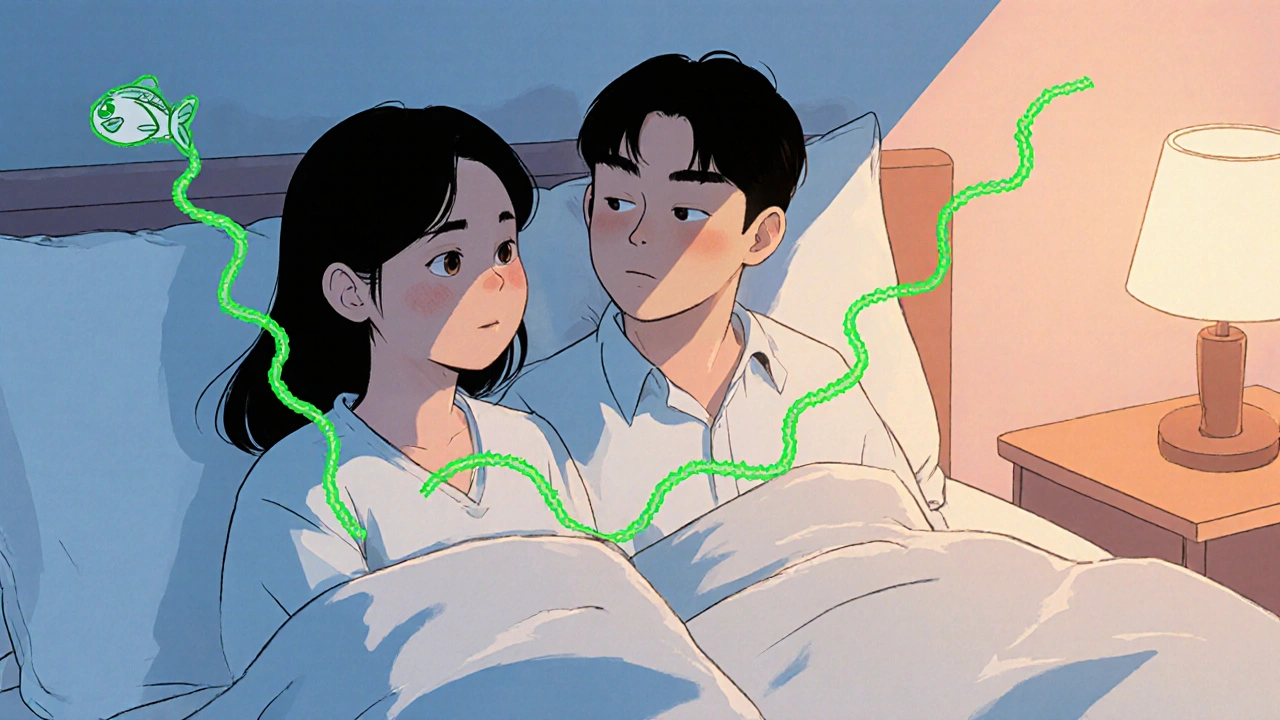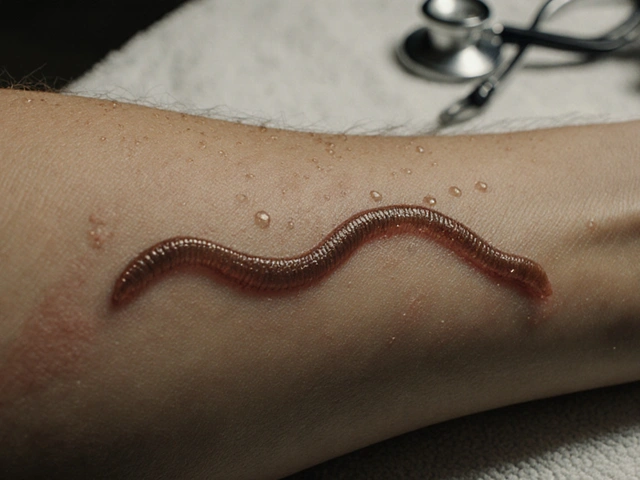
BV Symptom Checker
This tool helps you assess your symptoms against common indicators of bacterial vaginosis (BV). Please check any symptoms you're experiencing. This tool is not a diagnostic tool and does not replace professional medical advice.
Key Symptoms
Select your symptoms above and click 'Check My Symptoms' to see what they might indicate.
bacterial vaginosis is a common vaginal condition caused by an imbalance of the natural bacterial flora, especially a drop in Lactobacillus that normally keeps the environment acidic. When this balance shifts, other bacteria overgrow, leading to unpleasant symptoms and, more often than people admit, a noticeable impact on sex life and intimacy.
What Exactly Is Bacterial Vaginosis?
In plain terms, Bacterial Vaginosis (BV) isn’t an infection in the classic sense; it's a dysbiosis, meaning the community of microorganisms inside the vagina is out of sync. Healthy vaginas typically maintain a pH between 3.8 and 4.5, thanks to Lactobacillus producing lactic acid. BV pushes the pH above 4.5, allowing anaerobic bacteria such as Gardnerella vaginalis and Mobiluncus to thrive.
Unlike yeast infections, which are fungal and often cause itching, BV’s hallmark is a thin, grayish‑white discharge with a fishy odor that becomes stronger after sex. About one in three women will experience BV at some point, and many never even realize they had it because the symptoms can be subtle.
How BV Shows Up in the Bedroom
When you’re trying to be close with a partner, any change in how you feel or smell can throw a wrench in the works. Here are the most common ways BV interferes with intimacy:
- Odor concerns: The fishy smell can make both partners self‑conscious, leading to avoidance of kissing, oral sex, or even regular intercourse.
- Discharge discomfort: A wet feeling or clumpy discharge can feel messy, prompting a partner to withdraw or ask for “breaks.”
- Increased irritation: The altered pH can make the vaginal walls more sensitive, turning what’s normally pleasurable into a burning or itching sensation after sex.
- Psychological impact: Worry about being “unclean” or fear of a partner noticing can cause anxiety and reduce libido.
All of these factors can erode confidence, turning an otherwise healthy sexual relationship into a series of awkward moments.
Key Symptoms to Spot Early
Knowing the signs helps you act fast, which is crucial for keeping intimacy on track. Common symptoms include:
- Thin, gray‑white discharge that may be watery.
- Strong, fishy odor especially after sex or during menstruation.
- Itching or mild burning, though not as intense as a yeast infection.
- Vaginal irritation that worsens after intercourse.
If you notice any of these, a simple office visit or at‑home test kit can confirm BV. Early treatment often prevents the condition from becoming recurrent, which is a major win for your love life.

Treatment Options and What to Expect
Once diagnosed, the most common prescription routes are antibiotics that target the anaerobic bacteria:
- Metronidazole - taken orally (usually 500 mg twice a day for 7 days) or applied as a gel.
- Clindamycin - available as a cream or oral tablet.
Both are effective, but they can cause a temporary metallic taste or mild gastrointestinal upset. Importantly, you should abstain from sexual activity until you finish the full course and symptoms subside, otherwise you risk re‑infecting your partner or yourself.
Probiotics are not a cure, but many women find that daily Lactobacillus supplements help restore the natural balance after antibiotics.
Keeping Intimacy Alive While Treating BV
Pause doesn’t have to mean a pause in closeness. Here are practical ways to stay connected while you heal:
- Communicate early: Let your partner know you’ve been diagnosed and explain the treatment plan. Most people appreciate honesty and will be supportive.
- Try alternative intimacy: Focus on cuddling, massages, or oral stimulation that doesn’t involve deep penetration until the odor and discharge clear up.
- Practice good hygiene together: Shower before and after sex, use unscented condoms, and avoid douching, which can worsen BV.
- Use a barrier: A non‑lubricated condom can reduce the exchange of fluids that may prolong the odor, making the experience more comfortable for both.
- Plan for the “after”: Keep a spare set of clean underwear and a fresh pair of panties nearby for post‑sex changes.
The goal is to keep the emotional bond strong while the physical symptoms clear.

Prevention Strategies for Long‑Term Sexual Health
Prevention is the best way to keep BV from crashing your love life repeatedly. Consider these habits:
- Skip douching: It strips away good bacteria and invites the bad ones.
- Wear breathable underwear: Cotton lets the area stay dry, discouraging bacterial overgrowth.
- Limit scented products: Perfumed soaps, sprays, and wipes can irritate the vaginal lining.
- Use condoms strategically: While condoms don’t prevent BV directly, they can reduce exposure to partner’s semen, which may temporarily raise pH.
- Stay on top of routine check‑ups: Regular pelvic exams help spot imbalances before they flare.
Adopting these tweaks won’t guarantee you never get BV, but they dramatically cut the odds of recurrent episodes that can wear down intimacy over time.
Comparison with Other Vaginal Infections
Understanding how BV differs from yeast infections and trichomoniasis helps you explain the condition to a partner and also guides appropriate treatment.
| Aspect | Bacterial Vaginosis | Yeast Infection | Trichomoniasis |
|---|---|---|---|
| Cause | Overgrowth of anaerobic bacteria (e.g., Gardnerella) | Overgrowth of Candida fungus | Protozoan parasite Trichomonas vaginalis |
| Typical pH | >4.5 (alkaline) | 3.8-4.5 (acidic) | >4.5 (alkaline) |
| Discharge | Thin, gray‑white, fishy odor | Thick, white, “cottage‑cheese” texture | Yellow‑green, frothy, strong odor |
| Itching | Mild‑moderate | Intense | Moderate |
| Treatment | Metronidazole or Clindamycin | Fluconazole or topical azoles | Metronidazole (single dose) |
Notice the pH difference? BV and trichomoniasis both raise pH, while yeast keeps it low. That’s why a simple pH test strip at the pharmacy can point you in the right direction before you see a clinician.
Frequently Asked Questions
Can I get BV from a single sexual encounter?
BV isn’t classified as a classic sexually transmitted infection, but new or multiple partners can shift the vaginal flora, making an episode more likely. A single encounter can be enough if the partner’s semen raises the vaginal pH.
Will my partner need treatment too?
Usually not, because BV isn’t a true infection. However, if symptoms persist for both of you, a doctor may suggest treating the partner with a single dose of metronidazole.
How long does it take for intimacy to feel normal again?
Most women notice a drop in odor and discharge within 3‑5 days of starting antibiotics. Full confidence often returns once the final dose is finished and any irritation subsides, typically within a week.
Can I use condoms while on antibiotics?
Yes, condoms are safe and can help keep the area dry. Just choose latex or polyurethane condoms without spermicidal lubricants, which could further irritate the vagina.
Is BV linked to infertility?
Chronic, untreated BV can increase the risk of pelvic inflammatory disease, which may affect fertility. Prompt treatment and preventive habits keep that risk low.
Bottom line: bacterial vaginosis is a manageable condition, but ignoring it can sneakily erode the fun and closeness you and your partner share. Spot the symptoms, treat early, keep the conversation open, and you’ll stay on track for a healthy, enjoyable sex life.
15 Comments
Write a comment
More Articles

Strange Skin Parasites: Cases of Worms and Bugs Living or Laying Eggs on Human Skin
Explore rare parasites that live in or lay eggs on human skin, from hookworm tracks to Guinea worm blisters, with symptoms, treatment, and prevention tips.

Poison Control Hotline: How It Works and What to Report About Medications
Learn how the poison control hotline works, what details to report about medications, and why calling 1-800-222-1222 can prevent ER visits and save lives. Free, expert help 24/7.

Patient Safety Goals in Medication Dispensing and Pharmacy Practice: How to Prevent Errors and Save Lives
Discover the real-world safety goals that prevent medication errors in pharmacies and hospitals. Learn how barcode scanning, high-alert drug controls, and system redesign-not just training-save lives.
Natalie Morgan
October 20, 2025 AT 21:53Knowing that BV pushes vaginal pH above 4.5 explains the fishy smell after sex and why discharge feels different